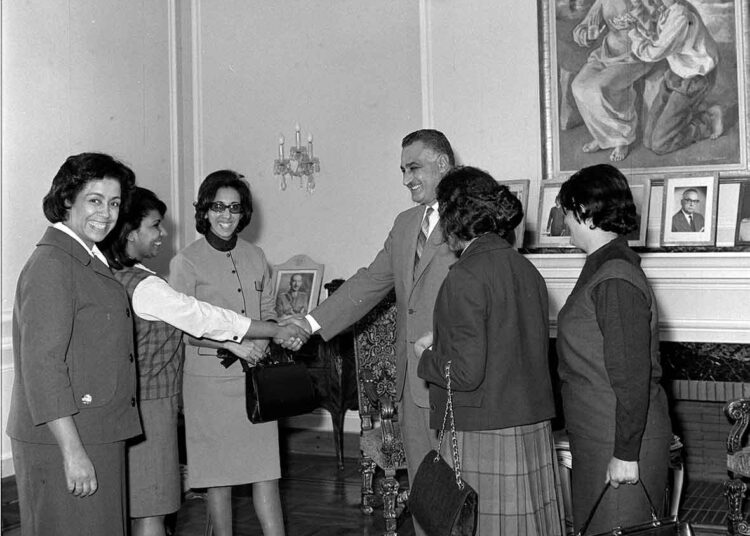By Ramadan Abdel Kader
In 1962, Egypt made history in women’s empowerment. That year saw the appointment of Hikmat Abu Zeid, a university professor, as the minister of social affairs, becoming the country’s first female minister.
The appointment came to build on gains that Egyptian women had earned since the 1919 revolution that espoused liberalism and raised awareness about rights of women, who took to the streets for the first time in the country demanding an end to British occupation and pushing for national independence.
During her years in the post, Abu Zeid transformed the ministry into a catalyst for activities, which spread across the nation that was in the throes of rebirth and drastic development.
“When the news went round that the first woman minister will be appointed, there was no big joy as the entire society – men and women – was experiencing a state of surprise because the 1952 revolution triggered constant change for building a new society,” Abu Zeid said in a press interview before her death in 2011.
To some of her compatriots, she was a role model in pursuing ambition and national dedication.
Born in 1922 in the southern governorate of Assiut, Abu Zeid had displayed a strong sense of patriotism since early years of adulthood. With the backing of her father, a rail inspector, she completed elementary schooling in her hometown.
To join a secondary school, she had to leave for Cairo. She attended a school in the Cairo suburb of Helwan. Her participation in a protest against British colonialism resulted in her dismissal from the school. Later, she was reinstated, but was sent to a school in the coastal city of Alexandria.
In 1940, she enrolled at the Fouad I University (the present-day Cairo University) where she became a student at the school of arts headed at the time by pioneering liberal writer Taha Hussein. After graduation, she briefly worked as a schoolteacher before she earned her master’s and doctorate’s degrees at Scotland’s University of St Andrews and London University.
On her home return, she became a lecturer at the Women’s School of the Cairo-based Ain Shams University.
Soon, tensions flared up between Egypt on the one hand and Britain and France on the other after then Egyptian president Gamal Abdel Nasser nationalised the Suez Canal in July 1956 to use its revenue into constructing the High Dam, a hydroelectric plant in Aswan.
Months later, the so-called Suez Crisis reached its apogee when Britain, France and Israel jointly attacked Egypt in what came to be known as the “tripartite aggression”. The onslaught outraged the Egyptians and boosted the stature of Abdel Nasser who had led the 1952 revolution that toppled the British-backed monarch. The Egyptians rushed to volunteer to fight the aggressors on the frontlines in the Suez Canal cities. Along with other women, Abu Zeid was among those volunteers who helped in offering services ranging from medical aid to fighting.
Under international pressure, the three countries halted their offensive and withdrew their troops, an event that catapulted Abdel Nasser’s renown to fresh heights.
At the time, the young revolutionaries led by Abdel Nasser unleashed mass-scale changes that transformed Egypt in different walks of life.
Women were admittedly a major pillar and a target of those changes.
In 1956, Egypt adopted a new constitution, providing for equality between men and women in rights including political rights. That year, Egyptian women also got the right to vote and stand for public offices. The following year, two women became elected members of the parliament.
In the early 1960s, an ad-hoc committee was set up to draft a national charter for Egypt. Abu Zeid was one member. Her debate with Abdel Nasser about the draft charter drew his admiration.
In September 1962, Abu Zeid was named a minister of social affairs, becoming the Arab world’s second woman to be picked as a government minister after Naziha Al Delmi of Iraq.
As a minister, Abu Zeid initiated a series of projects that aimed to promote social justice and enhance economic empowerment of women and their families in the countryside. They included one that encouraged rural families to manufacture products made of local raw materials. Another was significantly dubbed the “Rural Female Pioneers”.
In 1964, Abu Zeid contributed to drafting Egypt’s first law that regulated and boosted work of the non-governmental organisations in the country.
In 1969, Abdel Nasser tasked Abu Zeid with relocating Nubians in Upper Egypt after their area was flooded. In appreciation of her efforts, Abdel Nasser called her the “merciful heart of the revolution”.
After Abdel Nasser’s death in 1970, Abu Zeid re-launched her university career. But she left Egypt and lived for years in exile, mainly in Libya, after she balked at the new president Anwar el-Sadat’s normalisation policy towards Israel. She vociferously criticised the 1979 peace treaty that el-Sadat signed with Israel, making Egypt the first Arab country to establish diplomatic links with Tel Aviv.
Libya’s then head of state Moammar Gaddafi, who was at loggerheads with el-Sadat, conferred on Abu Zeid a top medal.
In 1991, an Egyptian high court revoked an earlier order sequestering her properties, and confirmed her right to hold an Egyptian passport. Abu Zeid returned to Egypt in the era of el-Sadat’s successor, Hosni Mubarak. She died on July 30, 2011.
Her acknowledged contributions to public life, made at a crucial time of the homeland’s modern history, as well as her efficiency as a government minister, have boosted women’s credentials in holding leading jobs.
In recent years, Egyptian women have carved out a niche for themselves in practically every domain.
The current government comprises eight female ministers amid a vigorous, high-profile campaign to advance women’s empowerment in the country.






Discussion about this post